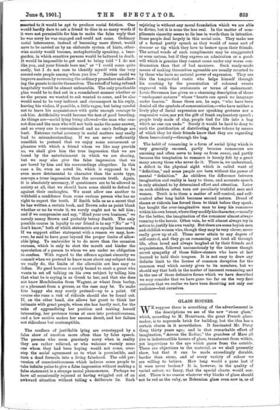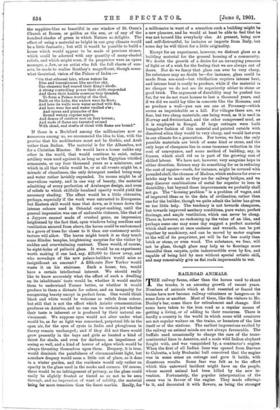GLASS HOUSES.
NVE suppose there is something of the advertisement in the descriptions we see of the new "stone glass," which, according to M. Henrivaux, the great French glass- maker, is to supersede brick for building, but the idea has a certain charm in it nevertheless. It fascinated Mr. Percy Greg thirty years ago; and in that remarkable effort of imagination, "Across the Zodiac," the grandees of Mars all live in indestructible houses of glass, translucent from within, yet impervious to the eye which gazes from the outside. There are objections to the material, as we shall presently show, but that it can be made exceedingly durable, harder than stone, and of every variety of colour we are willing to believe. How long would a pane last if it were never broken ? It is, however, in the quality of varied colour, we fancy, that the special charm would con- sist. There is no reason whatever why blocks of glass should not be red as the ruby, as Bohemian gleam even now is, or of
the sapphire-blue so beautiful in one window of St. Ouen's Church at Rouen, or golden as the sun, or of any of the hundred shades of green in which Nature so delights. The effect of using a material so bright in our grey climate would be a little fantastic ; but still it would be possible to build a house which would appear to be made of precious stones, which could be adorned with any quantity of many-shaded reliefs, and which might even, if its proprietor were an opera manager, a Jew, or an artist who felt the full charm of sun- sets, be made to realise Southey's magnificent, though some- what theatrical, vision of the Palace of Indra :—
" On that ethereal lake, whose waters lie
Blue and transpicuous like another sky, The elements had reared their King's abode.
A'strong controlling power their strife suspended And there their hostile essences they blended, To form a Palace worthy of the God.
Built on the Lake, the waters were its floor; And here its walls were water arched with fire,
And here were fire and water vaulted o'er; And spires and pinnacles of fire
Round watery cupolas aspire. And domes of rainbow rest on fiery towers ; And roofs of flame are turreted around With cloud, and shafts of cloud with flame are bound."
If there is a Beckford among the millionaires now so numerous among us, we recommend the idea to him, with the proviso that his architecture must not be Gothic, and Arab rather than Italian. The material is for the Alhambra, not for a Christian Minster. He would have a house unlike any other in the world, that would continue to exist, unless artillery were used against it, as long as the Egyptian vitrified ornaments, or say four thousand years as a minimum, and which in all that while would be, or at all events might be, a miracle of cleanliness, the only detergent needed being soap and water rather lavishly expended. Its rooms might be of marvellous variety, and in one way of beauty, the material admitting of every perfection of Arabesque design, and even of reliefs to which skilfully localised opacity would yield the necessary shading. The effect would be a little obtrusive, perhaps, especially if the work were entrusted to Europeans, but Eastern skill would tone that down, as it tones down the intense colours used in Oriental carpet-making, until the general impression was one of endurable richness, like that of a Jeypore enamel made of crushed gems, an impression heightened by the fact that, open windows being needless and ventilation secured from above, the house could be embosomed in a grove of trees far closer to it than our customary archi- tecture will allow. The leaves might touch it as they touch some Hindoo temples, heightening surprise for the visitor by sudden and overwhelming contrast. There would, of course, be sight-holes of pellucid glass. It would be an experiment worth making if one had, say, 220,000 to throw away, and who nowadays of the new palace-builders would miss so insignificant an amount ? A fifth-rate New Yorker would waste it on his staircase. Such a house, too, would have a certain intellectual interest. We should really like to know accurately what the effect of such a dwelling on its inhabitants' taste would be, whether it would enable them to understand Turner better, or whether it would produce in them a distaste for colour, and an incapacity for recognising beauty except in perfect form. One would think black and white would be welcome as reliefs from colour, but still that is not the effect which Asiatic ornamentation produces on Asiatics, and no one can be certain yet whether their taste is inherent or is produced by their natural en- vironment. We suppose eyes would not alter under what would be, as far as light was concerned, perpetual life in the open air, for the eyes of ryots in India and ploughmen in Surrey remain unchanged; and if they did not there would grow presently in the boys and girls so located a kind of thirst for shade, and even for darkness, an impatience of seeing so well, and a kind of horror of edges which would be always thrusting themselves upon them. Drapery, it is true, would diminish the painfulness of circumambient light, but somehow drapery would seem a little out of place, as it does in a winter garden, and the residents would rely rather on opacity in the glass used in the nooks and corners. Of course, there would be no infringement of privacy, as the glass could easily be slightly frosted or tinted so as not to be seen through, and no impression of want of solidity, the material being far more tenacious than the finest marble. Really, for
a millionaire in want of a sensation such a building might be a new pleasure, and he would at least be able to feel that he was not housed like everybody else. At present, being new and self-distrustful, he imitates or imports from Italy, but some day he will thirst for a little originality.
Except for an experiment, however, we distrust glass as a building material for the general housing of a community. We doubt the growth of a desire for an unvarying pressure of light or of a wish for the feeling that we are always out of doors. Nor do we fancy that glass can ever be very cheap. Its substance may no doubt be—for instance, glass could be made from sea-sand—but vitrifaction requires intense heat, and intense heat is costly to produce, while if the material is no cheaper we do not see its superiority either to stone or good brick. The argument of durability may be pushed too far, for we do not want houses to last a thousand years, and if we did we could lay tiles in concrete like the Romans, and so produce a wall—you can see one at Pevensey—which seems as imperishable as a hilL For villages there are, we fear, but two cheap materials, one being wood, as it is used in Norway and Switzerland, and the other compressed mud, as it is employed in Bengal. If large cottages were built bungalow fashion of this material and painted outside with dissolved silica they would be very cheap, and would last even in our climate for a generation. For towns, we fear, the only possible materials are brick of some kind or stone, and the only hope of cheapness lies in some immense reduction in the cost of conveyance, and some method of building, say, in frames, which shall rid us in part of the growing cost of skilled labour. We have not, however, very sanguine hope in either direction. Science may do something for us in reducing the cost of repairs—roofs, for instance, might be covered with pounded shell, the chunam of Madras, which endures for ever— bricks may be made as they are for railway bridges, and we may discover combinations of metal far superior to iron in durability; but beyond these improvements we probably shall not go. The "housing problem" is a problem of wages, and of improved ideas as to the data of civilisation, rather than one for the builder, though we quite admit the latter has given us too little help. The tendency is not towards cheapness, but towards improved sanitary conditions, pure water, perfect drainage, and ample ventilation, which can never be cheap. There is, however, no reckoning up the value of an idea, and perhaps some one may some day suggest a perfect material which shall secure at once coolness and warmth, can be put together by machinery, and can be moved by motor engines at the will of its proprietor, yet will be far less costly than brick or stone, or even wood. The substance, we fear, will not be glass, though glass may help us to floorings more beautiful than carpets, quite indestructible even by fire, and capable of being laid by men without special artistic skill, and may conceivably give us flat roofs impermeable to wet.







































 Previous page
Previous page